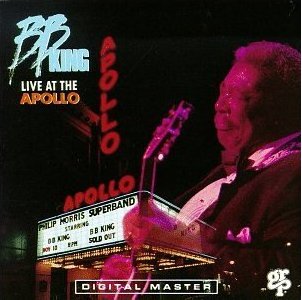
| Artist: | B. B. King |
| Title: | Live at the Apollo |
| Released: | 1997 |
| Label: | MCA Records |
| Time: | 76:49 |
| Producer(s): | Carl Griffin |
| Appears with: | |
| Category: | Blues |
| Rating: | *******... (7/10) |
| Media type: | CD |
| Purchase date: | 2007.06.12 |
| Price in €: | 4,99 |
| Web address: | www.bbking.com |